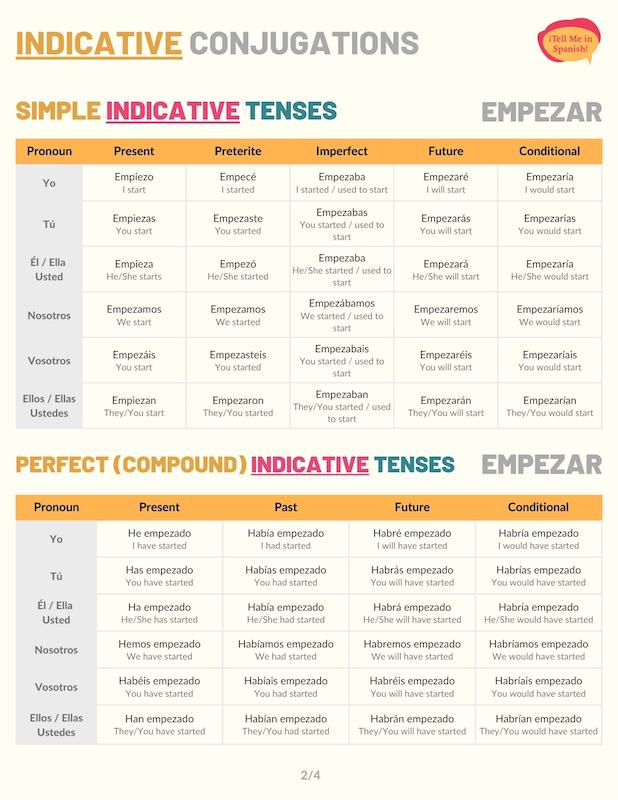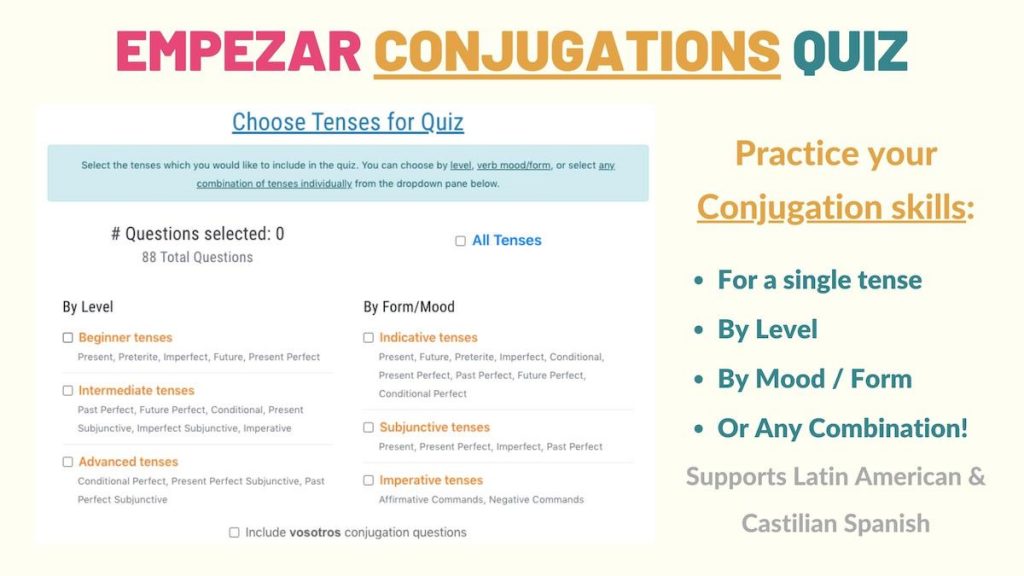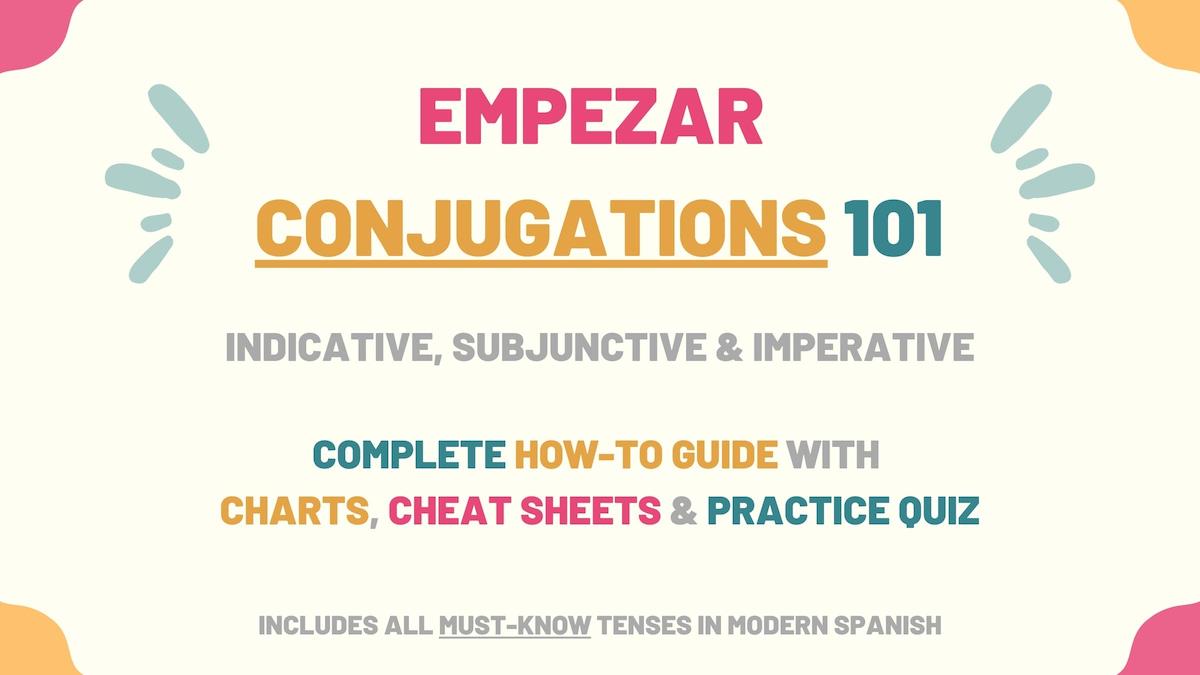Learning empezar conjugation patterns can help you practice -AR verbs with an E to IE stem change. Since this verb is also essential for your conversations, in this guide, we’ll learn how to conjugate empezar in Spanish. Here is an overview of what we’ll cover.
- Empezar Overview
- Indicative Tenses of Empezar Conjugations
- Subjunctive Tenses of Empezar Conjugations
- Imperative (Commands) of Empezar Conjugations
- Uses & Examples
- Download Empezar Conjugation Tables & Uses Cheat sheets
- Empezar Conjugation Practice Quiz
Overview of Empezar
| Verb Characteristic | Property |
|---|---|
| Verb Type | -AR |
| Irregular | Yes |
| Infinitive | Empezar |
| Gerund (Present Participle) Form | Empezando |
| Past Participle Form | Empezado |
| Synonyms | Comenzar, iniciar. |
Stem Changes: E to IE and -Z to -C
- Present Indicative: empiez for all subject pronouns except ‘nosotros’ and ‘vosotros’.
- Preterite: empec only for ‘yo’.
- Present Subjunctive: empec for ‘nosotros’ and ‘vosotros’, empiec for the remaining subject pronouns.
- Affirmative Imperative: empiez for all subject pronouns except ‘vosotros’.
- Negative Imperative: empec only for ‘vosotros’, empiez for the remaining subject pronouns.
Indicative Conjugations of Empezar
Present tense
Empezar conjugation in the present tense has an E to IE stem change for all subject pronouns except ‘vosotros’ and ‘nosotros’. Conjugate this verb to the present indicative to say that an activity or event starts. For example: La película empieza en una hora.
| Person | Conjugation | Translation |
|---|---|---|
| Yo | Empiezo | I start |
| Tú | Empiezas | You start |
| Él / Ella Usted | Empieza | He/She starts You (formal) start |
| Nosotros | Empezamos | We start |
| Vosotros | Empezáis | You start |
| Ellos / Ellas Ustedes | Empiezan | They start You (plural) start |
Preterite tense
Empezar’s preterite conjugation patterns have no stem changes for the most part. Use the stem empec for the subject pronoun ‘yo’. When conjugated to the preterite tense, this verb communicates that an action started at a specific moment in the past.
For example: Hace dos años, empecé a estudiar español.
| Person | Conjugation | Translation |
|---|---|---|
| Yo | Empecé | I started |
| Tú | Empezaste | You started |
| Él / Ella Usted | Empezó | He/She started You (formal) started |
| Nosotros | Empezamos | We started |
| Vosotros | Empezasteis | You started |
| Ellos / Ellas Ustedes | Empezaron | They started You (plural) started |
Take Note: In this tense, we have a z to c change because, in Spanish, we must replace the letter z for c in front of the vowel e. This change is applied to verbs ending with -zar, such as comenzar, almorzar, reemplazar, etc.
Imperfect tense
As shown in the empezar conjugation chart below, this verb has no changes when conjugated to the imperfect tense. Use these conjugations to talk about activities people used to start repeatedly in the past. For example: Mi programa favorito empezaba a las 8.
| Person | Conjugation | Translation |
|---|---|---|
| Yo | Empezaba | I started I used to start |
| Tú | Empezabas | You started You used to start |
| Él / Ella Usted | Empezaba | He/She started He/She used to start You (formal) started You (formal) used to start |
| Nosotros | Empezábamos | We started We used to start |
| Vosotros | Empezabais | You started You used to start |
| Ellos / Ellas Ustedes | Empezaban | They started They used to start You (plural) started You (plural) used to start |
Near future
The Spanish near or immediate future tense is formed with the present conjugations of ir + a + empezar. These empezar conjugations allow you to express that something will start soon in the future. For instance: En unos minutos, mis amigos van a empezar a llegar.
| Person | Conjugation | Translation |
|---|---|---|
| Yo | Voy a empezar | I’m going to start |
| Tú | Vas a empezar | You’re going to start |
| Él / Ella Usted | Va a empezar | He/She is going to start You (formal) are going to start |
| Nosotros | Vamos a empezar | We’re going to start |
| Vosotros | Vais a empezar | You’re going to start |
| Ellos / Ellas Ustedes | Van a empezar | They’re going to start You (plural) are going to start |
Future simple tense
Use empezar in the Spanish future simple tense to say that an activity will start at some point in the future. Creo que empezaremos a trabajar la próxima semana.
| Person | Conjugation | Translation |
|---|---|---|
| Yo | Empezaré | I will start |
| Tú | Empezarás | You will start |
| Él / Ella Usted | Empezará | He/She will start You (formal) will start |
| Nosotros | Empezaremos | We will start |
| Vosotros | Empezaréis | You (formal) will start |
| Ellos / Ellas Ustedes | Empezarán | They will start You (plural) will start |
Conditional tense
This verb conjugated to the conditional tense in Spanish expresses that someone or something would start an activity. If applicable to your statement, you can use si sentences to introduce the conditions that need to be met. Here is an example: ¿Por qué la fiesta empezaría tan tarde?
| Person | Conjugation | Translation |
|---|---|---|
| Yo | Empezaría | I would start |
| Tú | Empezarías | You would start |
| Él / Ella Usted | Empezaría | He/She would start You (formal) would start |
| Nosotros | Empezaríamos | We would start |
| Vosotros | Empezaríais | You would start |
| Ellos / Ellas Ustedes | Empezarían | They would start You (plural) would start |
Present perfect tense
To form the present perfect tense in Spanish, use haber in the present tense + empezado (past participle). In this tense, empezar conveys whether an activity has started or not. For instance: Todavía no hemos empezado el proyecto.
| Person | Conjugation | Translation |
|---|---|---|
| Yo | He empezado | I have started |
| Tú | Has empezado | You have started |
| Él / Ella Usted | Ha empezado | He/She has started You (formal) have started |
| Nosotros | Hemos empezado | We have started |
| Vosotros | Habéis empezado | You have started |
| Ellos / Ellas Ustedes | Han empezado | They have started You (plural) have started |
Past perfect
Conjugate empezar to the past perfect tense in Spanish to explain that an activity had started before another past reference point. The formula to conjugate this tense is haber (imperfect form) + past participle form of ‘empezar’. Cuando llegamos, ya habían empezado a cenar.
| Person | Conjugation | Translation |
|---|---|---|
| Yo | Había empezado | I had started |
| Tú | Habías empezado | You had started |
| Él / Ella Usted | Había empezado | He/She had started You (formal) had started |
| Nosotros | Habíamos empezado | We had started |
| Vosotros | Habíais empezado | You had started |
| Ellos / Ellas Ustedes | Habían empezado | They had started You (plural) had started |
Future perfect
The future perfect forms of empezar allow you to say that an activity will have started by or before a certain time in the future. ¿Crees que ya habrán empezado a abordar?
| Person | Conjugation | Translation |
|---|---|---|
| Yo | Habré empezado | I will have started |
| Tú | Habrás empezado | You will have started |
| Él / Ella Usted | Habrá empezado | He/She will have started You (formal) will have started |
| Nosotros | Habremos empezado | We will have started |
| Vosotros | Habréis empezado | You will have started |
| Ellos / Ellas Ustedes | Habrán empezado | They will have started You (plural) will have started |
Conditional perfect
In Spanish, empezar conjugated to the conditional perfect tense expresses that an activity would have started if a past condition had occurred. For example: Si hubiera sabido que era urgente, habría empezado a prepararlo antes.
| Person | Conjugation | Translation |
|---|---|---|
| Yo | Habría empezado | I would have started |
| Tú | Habrías empezado | You would have started |
| Él / Ella Usted | Habría empezado | He/She would have started You (formal) would have started |
| Nosotros | Habríamos empezado | We would have started |
| Vosotros | Habríais empezado | You would have started |
| Ellos / Ellas Ustedes | Habrían empezado | They would have started You (plural) would have started |
Progressive tenses
The progressive tenses of empezar are used to emphasize that an action is starting at the moment of speaking. Or, in the case of past forms, to say that something was starting when a past action took place. For example: A las 8, mis hermanos estaban empezando a jugar.
| Progressive Tense | Formula | Translation Example |
|---|---|---|
| Present | Estar (present) + empezando | I am starting |
| Preterite | Estar (preterite) + empezando | You were starting |
| Imperfect | Estar (imperfect) + empezando | He was starting |
| Future | Estar (future) + empezando | We will be starting |
| Conditional | Estar (conditional) + empezando | They would be starting |
Empezar Subjunctive Conjugations
In Spanish, the subjunctive mood is used to talk about someone’s hopes, expectations, uncertainty about an activity, suggestions, demands, wishes, or potential outcomes. We’ll review the empezar conjugation charts for the key subjunctive tenses in the coming sections.
Present subjunctive
Empezar present subjunctive conjugations have an E to IE stem change for all subjects except ‘nosotros’ and ‘vosotros’. Additionally, all subject pronouns have a z to c change. You can see these patterns in the empezar conjugation chart below.
When conjugated to this tense, we use empezar to express wishes or request someone to start something. For example: Ojalá que pronto empieces a ganar más dinero.
| Person | Conjugation | Translation |
|---|---|---|
| Yo | Empiece | I start |
| Tú | Empieces | You start |
| Él / Ella Usted | Empiece | He/She starts You (formal) start |
| Nosotros | Empecemos | We start |
| Vosotros | Empecéis | You start |
| Ellos / Ellas Ustedes | Empiecen | They start You (plural) start |
Take Note: When conjugating verbs ending with -zar to the subjunctive tense, we must replace z with c because all the subjunctive endings start with the vowel ‘e’.
Present perfect subjunctive
Haber in the present subjunctive + empezado is how we form the present perfect subjunctive of ‘empezar’. Use these conjugations to express uncertainty or wish that an activity has already started. Espero que hayas empezado a limpiar tu cuarto.
| Person | Conjugation | Translation |
|---|---|---|
| Yo | Haya empezado | I have started |
| Tú | Hayas empezado | You have started |
| Él / Ella Usted | Haya empezado | He/She has started You (formal) have started |
| Nosotros | Hayamos empezado | We have started |
| Vosotros | Hayáis empezado | You have started |
| Ellos / Ellas Ustedes | Hayan empezado | They have started You (plural) have started |
Imperfect subjunctive
When conjugated to the imperfect subjunctive tense, empezar refers to past suggestions, expectations, wishes, or hopes someone had about a person starting an action. For example: Yo quería que empézaramos a pintar la sala hoy.
Depending on whether you’re learning Castilian or Latin American Spanish, there are two ways to conjugate the imperfect subjunctive:
Latin American Spanish version
| Person | Conjugation | Translation |
|---|---|---|
| Yo | Empezara | I started |
| Tú | Empezaras | You started |
| Él / Ella Usted | Empezara | He/She started You (formal) started |
| Nosotros | Empezáramos | We started |
| Ellos / Ellas Ustedes | Empezaran | They started You (plural) started |
Note: Since vosotros is not used in Latin American Spanish, the empezar conjugation for this pronoun has not been included in the chart.
Castilian Spanish version
| Person | Conjugation | Translation |
|---|---|---|
| Yo | Empezase | I started |
| Tú | Empezases | You started |
| Él / Ella Usted | Empezase | He/She started You (formal) started |
| Nosotros | Empezásemos | We started |
| Vosotros | Empezaseis | You started |
| Ellos / Ellas Ustedes | Empezasen | They started You (plural) started |
Past perfect subjunctive
The past perfect subjunctive of empezar expresses that an action would have started if a past condition was fulfilled. These forms also convey regret or hypothetical outcomes if you had started something. For example: Si hubieras empezado antes, habríamos terminado a tiempo.
| Person | Conjugation | Translation |
|---|---|---|
| Yo | Hubiera empezado | I had started |
| Tú | Hubieras empezado | You had started |
| Él / Ella Usted | Hubiera empezado | He/She had started You (formal) had started |
| Nosotros | Hubiéramos empezado | We had started |
| Vosotros | Hubierais empezado | You had started |
| Ellos / Ellas Ustedes | Hubieran empezado | They had started You (plural) had started |
Empezar Imperative Conjugations
The Spanish imperative or commands are used to tell people what to do or not to do.
Affirmative commands
This verb’s affirmative commands conjugations are formed with an E to IE and a z to c stem change. Check the empezar conjugation table below to see which subject pronouns are affected by these changes.
These affirmative imperative forms are used to order someone to start doing something. For example: Por favor, empiecen a contestar su examen.
| Person | Conjugation | Translation |
|---|---|---|
| Tú | Empieza | Start |
| Usted | Empiece | Start |
| Vosotros | Empezad | Start |
| Ustedes | Empiecen | Start |
Negative commands
These empezar conjugations have a z to c stem change for all subject pronouns. Additionally, some pronouns may also be affected by an E to IE change. To order someone not to start doing something, you must use the Spanish negative imperative. No empieces hasta que yo te diga.
| Person | Conjugation | Translation |
|---|---|---|
| Tú | No empieces | Don’t start |
| Usted | No empiece | Don’t start |
| Vosotros | No empecéis | Don’t start |
| Ustedes | No empiecen | Don’t start |
Meanings of Empezar & Examples
In the previous sections, we’ve learned how to conjugate empezar. Now we’ll review how to use this verb. Given that it’s the direct translation of ‘to start’ or ‘to begin’, empezar communicates the beginning of an activity.
[Empezar conjugated] + [complement]
¿Ya la empezaron a ver?
Did you guys already start watching it?
Empecé a estudiar español hace tres años.
I started learning Spanish three years ago.
La reunión empezará a las 9 de la mañana.
The meeting will start at 9 in the morning.
Take Note: Use the formula empezar + a + infinitive verb to say that someone is starting to do an activity. If the verb you use takes a direct object (such as watching something, reading a book, etc), you can use direct object pronouns to replace that information.
Download Empezar Conjugation Charts & Uses Cheat sheet

Empezar is one of the most commonly used -AR verbs in Spanish. It’s also a stem-changing verb, so it can be tricky to conjugate in many of its tenses. You can review its different forms in the empezar conjugation reference guide.
Practice Quiz: Empezar Conjugation

Congratulations! You’ve learned how to conjugate the verb empezar in Spanish. Now, you should take the empezar conjugation practice quiz to test your skills and practice this stem-changing AR verb.



